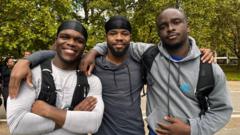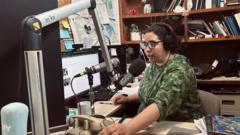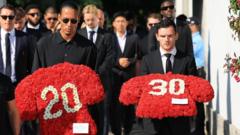In London's Hyde Park, the Ozo running club brings together the Nigerian Igbo community for physical fitness, cultural pride, and unity.
Running for Culture: The Rise of Nigerian Community in London

Running for Culture: The Rise of Nigerian Community in London
A new running club in London celebrates Igbo culture and fosters connections among its members.
The article text:
On a crisp Saturday morning in London's famous Hyde Park, runners gather around benches, uniting under the banner of the Ozo running club, primarily composed of Nigerians of Igbo descent. Founded by Chibueze Odoemene, Emeka Atumonyogo, and Chigo Ogbonna, the club seeks to create a vibrant space for young Igbo people to connect with their roots and each other.
In just three months, the Ozo running club has rapidly grown to over 300 members, reflecting not only a desire for community but also the global trend of increasing participation in social running clubs. Strava, a prominent running app, reported a 59% rise in running club memberships globally this year. For the Ozo runners, the experience transcends mere exercise; it is a celebration of cultural identity and shared passions.
As members prepare to split into speed groups, the park buzzes with energy, punctuated by the sounds of Afrobeats emanating from a nearby speaker. "Igbo kwenu!” calls out Mr. Odoemene, prompting a resounding “Eyy” from the group, a traditional call-and-response embodying their shared heritage.
The founders emphasize that their aim is not just about running but fostering a fun community atmosphere where friendships may blossom — or even love stories develop. Francesca Ngozi Ezennolim, who traveled from Reading for her first run, expressed a longing for Igbo connections, noting the scarcity of such friendships. Another newcomer, Jennifer Iwuamadi, echoed her sentiments, emphasizing the value of bonding with fellow Igbo people.
Despite being one of Nigeria's largest ethnic groups, Igbos face cultural challenges, with UNESCO warning in 2006 that the Igbo language risks extinction by 2025. According to statistics, the Igbo community in the UK increased from around 8,000 to 11,000 in the last decade, while the Yoruba population declined. Many younger Igbos express a need to distinguish their identity within the broader Nigerian context, often overshadowed by Yoruba representation in popular culture.
However, the Ozo club is inclusive, welcoming members from various backgrounds to learn about and appreciate Igbo culture. Past and present wounds from the Biafran war linger in the consciousness of Igbo people and manifest in their desire to reclaim their narrative and ensure their cultural contributions are recognized.
Uzoma Ehziem, a club pacer who arrived in the UK almost twenty years ago, highlights the underrepresentation of Igbo culture compared to their Yoruba counterparts. He recalls how conversations about Nigeria often begin with inquiries into Yoruba identity, underscoring the need for a diverse portrayal of Nigerian culture.
In addition to their weekly running sessions, the Ozo club organizes monthly social activities, fostering stronger community bonds, whether through karaoke nights, dodgeball games, or an upcoming Igbo gala. As the run concludes, camaraderie flourishes; members exchange contact details and make plans to reunite the following week, establishing connections that extend beyond mere acquaintances to lasting friendships rooted in culture and community pride.
With the promise of continued engagement, the Ozo running club not only nurtures physical well-being but also represents a steadfast commitment to cultural heritage, ensuring that the Igbo legacy thrives in the heart of London.
On a crisp Saturday morning in London's famous Hyde Park, runners gather around benches, uniting under the banner of the Ozo running club, primarily composed of Nigerians of Igbo descent. Founded by Chibueze Odoemene, Emeka Atumonyogo, and Chigo Ogbonna, the club seeks to create a vibrant space for young Igbo people to connect with their roots and each other.
In just three months, the Ozo running club has rapidly grown to over 300 members, reflecting not only a desire for community but also the global trend of increasing participation in social running clubs. Strava, a prominent running app, reported a 59% rise in running club memberships globally this year. For the Ozo runners, the experience transcends mere exercise; it is a celebration of cultural identity and shared passions.
As members prepare to split into speed groups, the park buzzes with energy, punctuated by the sounds of Afrobeats emanating from a nearby speaker. "Igbo kwenu!” calls out Mr. Odoemene, prompting a resounding “Eyy” from the group, a traditional call-and-response embodying their shared heritage.
The founders emphasize that their aim is not just about running but fostering a fun community atmosphere where friendships may blossom — or even love stories develop. Francesca Ngozi Ezennolim, who traveled from Reading for her first run, expressed a longing for Igbo connections, noting the scarcity of such friendships. Another newcomer, Jennifer Iwuamadi, echoed her sentiments, emphasizing the value of bonding with fellow Igbo people.
Despite being one of Nigeria's largest ethnic groups, Igbos face cultural challenges, with UNESCO warning in 2006 that the Igbo language risks extinction by 2025. According to statistics, the Igbo community in the UK increased from around 8,000 to 11,000 in the last decade, while the Yoruba population declined. Many younger Igbos express a need to distinguish their identity within the broader Nigerian context, often overshadowed by Yoruba representation in popular culture.
However, the Ozo club is inclusive, welcoming members from various backgrounds to learn about and appreciate Igbo culture. Past and present wounds from the Biafran war linger in the consciousness of Igbo people and manifest in their desire to reclaim their narrative and ensure their cultural contributions are recognized.
Uzoma Ehziem, a club pacer who arrived in the UK almost twenty years ago, highlights the underrepresentation of Igbo culture compared to their Yoruba counterparts. He recalls how conversations about Nigeria often begin with inquiries into Yoruba identity, underscoring the need for a diverse portrayal of Nigerian culture.
In addition to their weekly running sessions, the Ozo club organizes monthly social activities, fostering stronger community bonds, whether through karaoke nights, dodgeball games, or an upcoming Igbo gala. As the run concludes, camaraderie flourishes; members exchange contact details and make plans to reunite the following week, establishing connections that extend beyond mere acquaintances to lasting friendships rooted in culture and community pride.
With the promise of continued engagement, the Ozo running club not only nurtures physical well-being but also represents a steadfast commitment to cultural heritage, ensuring that the Igbo legacy thrives in the heart of London.





















